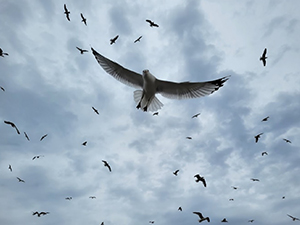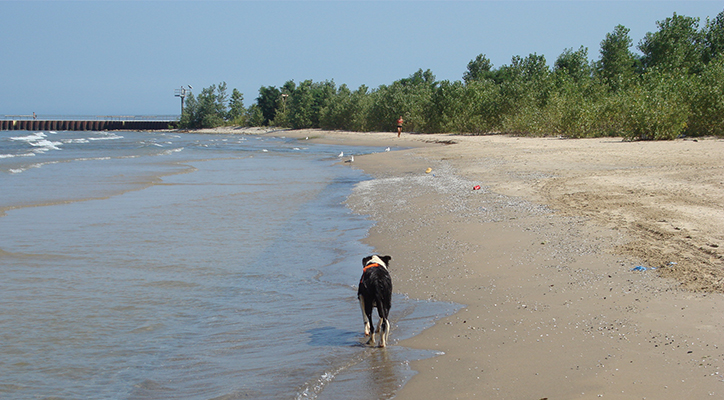Annual Gull Management Service Calendar
Sep 17, 2024
When gulls nest on your property, it can be challenging to pinpoint the appropriate deterrence strategy. Gull behavior changes throughout the year – which means a solution that deters gulls in March may not necessarily be successful in June. For long-term nuisance gull deterrence, you must implement solutions that target specific seasonal behaviors.
This blog outlines proven gull management strategies – and details when those strategies will be most effective, based on gull biology.
Mid-February to Mid-April:
Gull Behavior: Return to Breeding Grounds
From mid-February to mid-April, gulls migrate from their more southern wintering grounds to their northern breeding grounds and reconnect with mates or form new bonds. During this time, gulls often return to the locations where they nested in previous years. If those are not available, they look for new nesting grounds. Once a pair has settled on a location, they build their nest within their colony’s nesting area. As long as there are no eggs in the nest, federal law allows nesting material to be removed. However, removing this material alone will not dissuade the colony at large from nesting in that area.
Recommended Services: Permit Application and Harassment & Deterrence
Because gulls are federally protected, permits are required to remove their nests with eggs. If gulls are nesting on your property, Wild Goose Chase’s trained staff will help you acquire the necessary federal and/or state permits required to remove nests with eggs. This process can be time-consuming, so we advise clients to apply for permits at the beginning of the calendar year (January to February) to ensure they are secured prior to the nesting season.
Dog Harassment Service

One of the most effective ways to deter flocks of gulls is with a dog service. This harassment technique introduces trained border collies to congregations of gulls. The border collies chase and stalk the birds who, in turn, view the dogs as predators and disperse. With regular service, gulls learn to avoid any area targeted by border collies.
Since all gull species are protected at the federal level, it is important to engage only with qualified handlers and highly trained dogs. WGC’s dogs are trained to startle birds without touching or harming them and have proven obedience track records. To ensure continual harassment, our dog service is available in both the spring and fall. While the services are similar, the goals and techniques differ.
Spring dog service begins in the pre-nesting season, when colonies gather, and gulls form pairs and look for places to nest. Harassing gulls with dogs before the nesting season begins discourages pairs from settling on your property and helps to stop the problem before it begins. However, if gulls successfully nest on your property, harassment methods will be ineffective at keeping gulls from the area.
Laser Deterrence
In some situations, a dog service may not be the most appropriate solution. When gull colonies nest on roofs, for example, automated or handheld lasers are a better fit. Bird lasers emit a green laser beam that startles gulls into flight without harming them. Automated lasers operate in all weather conditions, can be programmed to run 24 hours a day, and can cover roughly 5 to 10 acres of open space. However, as with the dog service, if nesting occurs prior to harassment, the laser will have limited effect at deterring gulls.
April to August
Gull Behavior: Nesting & Raising Young
Starting in April, gulls begin to lay eggs. Females lay an average of 2 to 4 eggs, and the male and female take turns incubating them. Once all eggs are laid, they hatch in approximately 4 weeks. Young gulls may leave the nest a day or two after hatching but will stay nearby until they fledge. Young gulls rely on their parents to provide them with food and protection until they are old enough to take care of themselves. Therefore, adult gulls stay near their young until they can fly, typically at about 5 weeks old. During this time, the adults in the colony defend the young from potential threats, be they predators or humans.
Recommended Service: Egg Depredation
If your property has a history of nesting gulls, egg depredation is highly recommended. Adult gulls have natal and site fidelity, meaning they prefer to nest on the property where they were born (natal) and/or the property on which they’ve successfully nested previously (site).
During the nesting season, WGC service technicians systematically search for and remove any and all gull eggs observed on your property. Reducing the overall number of gulls on your property, by managing nest activity and removing eggs on a consistent basis, is an important step in managing nuisance gulls. By managing gull nesting, your property can reduce property and asset damage from gulls as well as reduce potential negative interactions between people and gulls.
Visits will occur for the length of the nesting season and the total number of visits may vary by colony size and activity. The frequency of service visits by WGC technicians is bird species dependent.
August to Mid-October
Gull Behavior: Return to Wintering Grounds
Once gulls are done nesting, and their young are old enough to fly, they begin to forage and travel in anticipation of fall migration. During this time, colonies break up and gulls begin to congregate in different areas as they search for food. If gulls nested on your property in the spring and summer, you may observe fewer gulls, but not a complete reduction. Until the time when gulls migrate south for their wintering grounds, they can still create messes and pose threats to humans.
Recommended Service: Deterrence & Harassment
In the fall, gulls congregate in large flocks to forage and loaf. In the late summer through mid-fall, dogs and/or bird lasers may be used to harass gulls and discourage them from resting or foraging on your property.
Manage Nuisance Gulls with Wild Goose Chase
Selecting the most appropriate gull deterrence solution can be challenging – but support is available. WGC’s team of biologists, environmental scientists, structural technicians, and rigorously trained border collies has helped property owners deter gulls and other nuisance birds from commercial, industrial and public properties since 1998.
For help achieving effective, long-term gull management on your property, schedule a site evaluation or contact us.





 0
0
